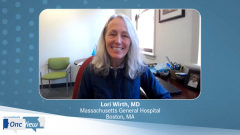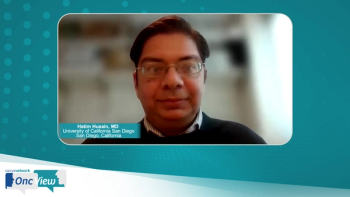
Presentation and Disease Course of Differentiated Thyroid Cancer
Lori Wirth, MD, provides an overview of differentiated thyroid cancer including patient presentation and disease course.
Episodes in this series

Matthew Fowler: Hello, and welcome to this Contemporary Cancer Network® OncView program titled, “Advances in Systemic Therapy of Differentiated Thyroid Cancer in Second Line and Beyond.” I’m Matthew Fowler, associate editor with Cancer Network®. We have with us today, Dr Lori Wirth, associate professor of medicine at Harvard Medical School, and Medical Director of the Center for Head and Neck Cancers at Massachusetts General Hospital. Thank you for joining us today, Dr Wirth. Let’s get started.
Lori Wirth, MD: Thanks, Matthew.
Matthew Fowler: So let’s really just start at the top, and I was just asking if you could provide a brief overview of differentiated thyroid cancer. And we’ll refer [to] that as DTC now because that is a mouthful.
Lori Wirth, MD: Differentiated thyroid cancer really is a spectrum of thyroid cancers. The most common differentiated thyroid cancer is a papillary thyroid cancer. We also see follicular thyroid cancers, hurthle cell carcinomas, and poorly differentiated thyroid cancers that all fall under that umbrella of DTC. It’s interesting because they all have a lot in common. They all rise from the follicular cell in the thyroid gland. But those very subtypes of different thyroid cancers do have different molecular drivers, and also different natural histories. So, when it’s convenient, we lump them together. When we need to get into specifics, we divvy them up.
Matthew Fowler: Perfect. And so, when looking at patients, I’ll ask you a 2-part question here. How do patients with DTC typically present? And how are they diagnosed?
Lori Wirth, MD: Patients who present with problems that ultimately lead to diagnosis with DTC can have a mass in the thyroid gland that’s picked up incidentally on some other imaging modality for some other problem. Say somebody was in a car crash and they had a neck CT, for example, or PET/CT scan for another problem and there will be an FDG [fluorodeoxyglucose] avid mass in the thyroid gland that then leads to a diagnosis. And that accounts for a fairly large number of differentiated thyroid cancers that we find. But with clinical presentation, the most common presentation is that the patient notices a lump in their neck, or a health care provider, like a primary care physician or an OBGYN person, will help in the physical examination, a mass. Generally, then patients will have an ultrasound. If there are characteristics on the ultrasound that warrant a fine needle aspiration, then that’s typically the next step in the diagnostic work up of a thyroid mass.
Matthew Fowler: And I think that leads nicely into this next question, which is what is the typical disease course and prognosis for patients with DTC?
Lori Wirth, MD: Most patients with DTC really have a disease that carries a very good prognosis. So most patients with DTC these days will have surgery first to address their disease. However, there are a lot of nuances to what the best surgical approach is based on the type of DTC it is as well as the extent of the disease. So a patient who has a small, say 2 cm papillary thyroid cancer primary tumor, based on fine need aspiration, and no suspicious lymph nodes in the neck might be able to get away with just a hemithyroidectomy. But in general, most patients will have surgery first. And then if patients have from a surgical point of view, intermediate risk or high-risk disease, meaning that there’s a risk that the cancer could come back, either local or regionally, or distantly, after surgery those patients in general will go on and have an adjuvant dose of radioactive iodine.
Matthew Fowler: Perfect. And to conclude this segment, could you comment on some of the challenges you’ve encountered with DTC treatment?
Lori Wirth, MD: For the initial approach to patients with typical DTC, garden variety DTC, there are 2 challenges. One challenge that we’ve realized is very important to be aware of is we have been overtreating a significant number of patients who present with very early-stage disease. Particularly, if patients have a thyroid nodule that’s less than 1 cm in size or less than 1.5 cm in size. Not all of those patients actually need to go on to have surgery, and by not overtreating patients with very early-stage disease that’s indolent, we can avoid complications from surgical management of these cases. Also, we’ve realized that we’re overtreating a number of patients with radioactive iodine. So there has been a re-evaluation of where radioactive iodine is off benefit and where it isn’t absolutely necessary. So managing the proper treatment to not overtreat patients with good prognostic disease is very important. And then on the other hand, I think another challenge is being able to recognize patients in their initial presentation of DTC who are at higher risk of having disease recurrence or developing distant metastatic disease in the future and making sure that their initial treatment strategies are optimized so that the best surgery is done from the get-go, so that they get radioactive iodine when it’s indicated. And then that they have proper follow up given the fact that they’re at higher risk for disease recurrence.
Matthew Fowler: Perfect. Thank you for that.
Transcript edited for clarity.
Newsletter
Stay up to date on recent advances in the multidisciplinary approach to cancer.





































